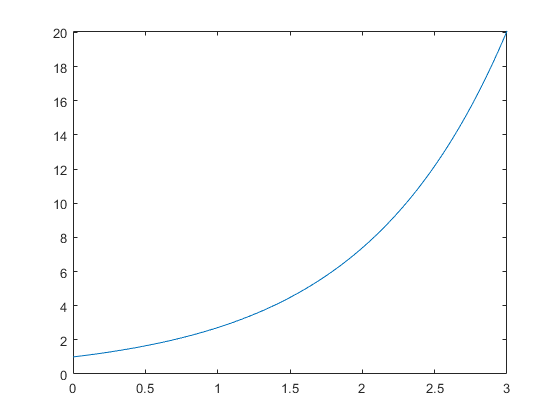Generate HDL Code from MATLAB Functions That Use Automated Lookup Table Generation
This example shows how to generate HDL code from a floating-point MATLAB® design that is not ready for code generation. Use the fixed-point conversion process by using the float2fixed setting with the codegen function to generate a lookup table based MATLAB function replacement. Use the new MATLAB replacement function to generate the HDL code.
The MATLAB code in the example is an implementation of a variable exponent function.
Specify Design and Test Bench
Specify the MATLAB design that you are generating HDL code for and the test bench script that simulates and tests the MATLAB function. The mlhdlc_replacement_exp.m file contains the design and the exponent function calculations. The MATLAB test bench is in the file mlhdlc_replacement_exp_tb.m.
design_name = 'mlhdlc_replacement_exp'; testbench_name = 'mlhdlc_replacement_exp_tb';
Examine the MATLAB design. The use of the function exp is not a supported fixed-point function for HDL code generation. By using automated lookup table generation in the following steps, you can convert the exp function to a lookup table that is supported for HDL code generation. For a list of supported functions, see Functions Supported for HDL and HLS Code Generation.
dbtype(design_name)
1 function y = mlhdlc_replacement_exp(u) 2 % 3 4 % Copyright 2014-2015 The MathWorks, Inc. 5 6 y = exp(u); 7 8 end
Simulate the Design
Simulate the design with the test bench to ensure there are no run-time errors.
mlhdlc_replacement_exp_tb

Generate HDL Code by Using Implicit Fixed-Point Conversion
Create a new script called, copy and paste the following code into the script, and save the file as runme.m. The runme executes the automated lookup table conversion and generates HDL code by using implicit fixed-point conversion.
Set up the path to your installed synthesis tool using <docid:hdlcoder_ref#burmn3j-1 hdlsetuptoolpath> function. This example uses Vivado(R). Use your own Xilinx Vivado installation path when executing the command.
hdlsetuptoolpath('ToolName', 'Xilinx Vivado', 'ToolPath', vivadopath);clear design_name testbench_name fxpCfg hdlcfg interp_degree design_name = 'mlhdlc_replacement_exp'; testbench_name = 'mlhdlc_replacement_exp_tb';
interp_degree = 0;
%% fixed point converter config
fxpCfg = coder.config('fixpt');
fxpCfg.TestBenchName = 'mlhdlc_replacement_exp_tb';
fxpCfg.TestNumerics = true;% specify this - for optimized HDL fxpCfg.DefaultWordLength = 10;
%% exp - replacement config
mathFcnGenCfg = coder.approximation('exp');
% generally use to increase accuracy; specify this as power of 2 for optimized HDL
mathFcnGenCfg.NumberOfPoints = 1024;
mathFcnGenCfg.InterpolationDegree = interp_degree; % can be 0,1,2, or 3
fxpCfg.addApproximation(mathFcnGenCfg); %% HDL config object
hdlcfg = coder.config('hdl');hdlcfg.TargetLanguage = 'Verilog';
hdlcfg.DesignFunctionName = design_name; hdlcfg.TestBenchName = testbench_name; hdlcfg.GenerateHDLTestBench=true;
hdlcfg.SimulateGeneratedCode=true;
%If you choose VHDL set the ModelSim compile options as well % hdlcfg.TargetLanguage = 'Verilog'; % hdlcfg.HDLCompileVHDLCmd = 'vcom %s %s -noindexcheck \n';
hdlcfg.ConstantMultiplierOptimization = 'auto'; %optimize out any multipliers from interpolation hdlcfg.PipelineVariables = 'y u idx_bot x x_idx';%
hdlcfg.InputPipeline = 2; hdlcfg.OutputPipeline = 2; hdlcfg.RegisterInputs = true; hdlcfg.RegisterOutputs = true;
hdlcfg.SynthesizeGeneratedCode = true; hdlcfg.SynthesisTool = 'Xilinx Vivado'; hdlcfg.SynthesisToolChipFamily = 'Virtex7'; hdlcfg.SynthesisToolDeviceName = 'xc7vh580t'; hdlcfg.SynthesisToolPackageName = 'hcg1155'; hdlcfg.SynthesisToolSpeedValue = '-2G';
%codegen('-config',hdlcfg) codegen('-float2fixed',fxpCfg,'-config',hdlcfg,'mlhdlc_replacement_exp')%If you only want to do fixed point conversion and stop/examine the %intermediate results you can use,
%only F2F conversion
codegen('-float2fixed',fxpCfg,'mlhdlc_replacement_exp')Generate a Circuit with a High Clock Rate
To generate a high clock rate circuit for the generated lookup table replacement function, follow these recommendations:
Use the number of points for the replacement function as a power.
Set the ConstantMultiplierOptimization to
Autoto allow HDL Coder™ to choose which Constant Multiplier Optimization yields the most area-efficient implementation in the generated HDL code. For more information, see Constant Multiplier Optimization.Use pipelined variables to minimize the clock delays and improve circuit frequency in the generated HDL code.
Output and Iterative Improvements
Run the runme.m script. After the fixed-point conversion completes the function replacements, the script outputs:
============= Step1: Analyze floating-point code ==============
Input types not specified, inferring types by simulating the test bench.
============= Step1a: Verify Floating Point ==============
### Analyzing the design 'mlhdlc_replacement_exp' ### Analyzing the test bench(es) 'mlhdlc_replacement_exp_tb' ### Begin Floating Point Simulation (Instrumented) ### Floating Point Simulation Completed in 1.8946 sec(s) ### Elapsed Time: 2.8361 sec(s)
============= Step2: Propose Types based on Range Information ==============
============= Step3: Generate Fixed Point Code ==============
### Generating Fixed Point MATLAB Code <a href="matlab:edit('codegen/mlhdlc_replacement_exp/fixpt/mlhdlc_replacement_exp_fixpt.m')">mlhdlc_replacement_exp_fixpt</a> using Proposed Types
### Generating Fixed Point MATLAB Design Wrapper <a href="matlab:edit('codegen/mlhdlc_replacement_exp/fixpt/mlhdlc_replacement_exp_wrapper_fixpt.m')">mlhdlc_replacement_exp_wrapper_fixpt</a>
### Generating Mex file for ' mlhdlc_replacement_exp_wrapper_fixpt '
Code generation successful: To view the report, open('codegen/mlhdlc_replacement_exp/fixpt/fxptmp/mlhdlc_replacement_exp_wrapper_fixpt/html/index.html').
### Generating Type Proposal Report for 'mlhdlc_replacement_exp' <a href="matlab:web('codegen/mlhdlc_replacement_exp/fixpt/mlhdlc_replacement_exp_report.html', '-new')">mlhdlc_replacement_exp_report.html</a>============= Step4: Verify Fixed Point Code ==============
### Begin Fixed Point Simulation : mlhdlc_replacement_exp_tb
### Fixed Point Simulation Completed in 1.9497 sec(s)
### Generating Type Proposal Report for 'mlhdlc_replacement_exp_fixpt' <a href="matlab:web('codegen/mlhdlc_replacement_exp/fixpt/mlhdlc_replacement_exp_fixpt_report.html', '-new')">mlhdlc_replacement_exp_fixpt_report.html</a>
### Elapsed Time: 2.6488 sec(s)As this is a small design with only one replacement functions you can try different number of points in approximation function generation. Re-examine the generated HDL code and compare it with the previous step.
### Begin VHDL Code Generation
### Generating HDL Conformance Report <a href="matlab:web('codegen/mlhdlc_replacement_exp/hdlsrc/mlhdlc_replacement_exp_fixpt_hdl_conformance_report.html')">mlhdlc_replacement_exp_fixpt_hdl_conformance_report.html</a>.
### HDL Conformance check complete with 0 errors, 2 warnings, and 0 messages.
### Working on mlhdlc_replacement_exp_fixpt as <a href="matlab:edit('codegen/mlhdlc_replacement_exp/hdlsrc/mlhdlc_replacement_exp_fixpt.vhd')">mlhdlc_replacement_exp_fixpt.vhd</a>.
### Generating package file <a href="matlab:edit('codegen/mlhdlc_replacement_exp/hdlsrc/mlhdlc_replacement_exp_fixpt_pkg.vhd')">mlhdlc_replacement_exp_fixpt_pkg.vhd</a>.
### The DUT requires an initial pipeline setup latency. Each output port experiences these additional delays.
### Output port 0: 12 cycles.
### Output port 1: 12 cycles. ### Generating Resource Utilization Report '<a href="matlab:web('codegen/mlhdlc_replacement_exp/hdlsrc/resource_report.html')">resource_report.html</a>'### Begin TestBench generation. ### Accounting for output port latency: 12 cycles.' ### Collecting data... ### Begin HDL test bench file generation with logged samples ### Generating test bench: codegen/mlhdlc_replacement_exp/hdlsrc/mlhdlc_replacement_exp_fixpt_tb.vhd ### Creating stimulus vectors ...
### Simulating the design 'mlhdlc_replacement_exp_fixpt' using 'ModelSim'. ### Generating Compilation Report codegen/mlhdlc_replacement_exp/hdlsrc/mlhdlc_replacement_exp_fixpt_vsim_log_compile.txt ### Generating Simulation Report codegen/mlhdlc_replacement_exp/hdlsrc/mlhdlc_replacement_exp_fixpt_vsim_log_sim.txt ### Simulation successful.
### Creating Synthesis Project for 'mlhdlc_replacement_exp_fixpt'. ### Synthesis project creation successful.
### Synthesizing the design 'mlhdlc_replacement_exp_fixpt". ### Generating synthesis report codegen/mlhdlc_replacement_exp/hdlsrc/vivado_prj/mlhdlc_replacement_exp_fixpt_syn_results.txt. ### Synthesis successful.
Examine the Synthesis Results
Open up the synthesis results saved in the mlhdlc_replacement_exp_fixpt_syn_results.txt file. In the synthesis report, the clock frequency reported by the synthesis tool does not have any optimization options enabled. The synthesis report shows a high clock speed in the order of 300 MHz.